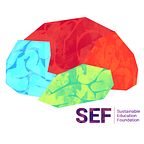Meet Sri Lankan Researcher — Kithmini Wijesiri
What are you currently working on or worked on before?
“Well, I model for a living!”
YES! I model drugs, proteins, chemicals and so much more. No fume hoods, no questionable stains, no unpleasant ammonia smells, and the best thing is all glassware contains a drinkable liquid! And that is my lab, the lab unlike any other, the lab where the strange individuals choose to live out their lives staring at virtual atoms and molecules on their monitors. I would call myself a Theoretical and Computational chemist, and indeed, I literally live in a virtual reality world. I’m currently working with the University of Connecticut, USA.
You can find my publications all listed here.
What encouraged you to pursue your research topic?
My undergraduate research projects were the major platform where I developed an enthusiasm in Computational chemistry. I had to carry out experiments employing software and high-performance computing techniques to determine the “Effect of synergism of cell-penetrating peptides in the spontaneous translocation of cell membranes.
Research on “Comparative study on the binding of cell-penetrating peptides to si-RNA, using Molecular Docking” is in progress. I was not only learning Computational techniques but also getting in touch with software such as Schrodinger and GROMACS. I developed an ability to create effective visual representations of models and data sets, acquired various levels of programming skills including Tcl/Tk, performing shell scripting with bash, code development, python, and also familiarized working within a windows or Linux environment.
Cell-penetrating peptides have been predominantly used in basic and preclinical research during the last 30 years. Conjugating therapeutics with cell-penetrating peptides could enhance their cellular internalization and therapeutic efficacy. They have potential applications in disease diagnosis and therapy, including cancer, inflammation, central nervous system disorders, and diabetes. CPP-based delivery systems possess an outstanding diagnostic therapeutic delivery potential.
Where do you find your best inspiration for your work?
Chemists used to create models of molecules using plastic balls and sticks. Today, the modeling is carried out in computers. The Nobel Prize in Chemistry 2013 was awarded jointly to Martin Karplus, Michael Levitt, and Arieh Warshel “for the development of multiscale models for complex chemical systems”.
More simply, these three chemists have been recognized for their development and application of methods to simulate the behavior of molecules from single molecules to proteins. The ground-breaking work of Karplus, Levitt, and Warshel is my inspiration.
What lessons would you share with a budding researcher?
Even though academic aspirations could be similar among researchers no two researchers are the same. What you go through, what you experience, is unique. So don’t compare your progress with anyone else’s. Have YOUR own goals and believe in yourself! There are NO shortcuts when doing research. It’s a long journey full of patience, resilience, and hard work and you’ve got to give it your best shot.
What motivated you to be a researcher?
In Sri Lanka, very few people consider pursuing Theoretical and Computational chemistry. Many research-based bio-pharmaceutical companies are seeking individuals with a solid background in chemistry along with computer training. Opportunities for entry and advancement are extremely limited for those without Ph.D. degrees and additional experience in a field of specialization.
My passion to apply science and global resources to deliver innovative therapies that extend and significantly improve lives is my motivation to be a researcher. It gives me great joy to work with colleagues all across the world to advance wellness, prevention, treatments, and cures that challenge the most feared diseases of our time.
According to your opinion, what are the changes that the Sri Lankan education system needs to do, in order to meet the requirement of the international industry and academia?
Sri Lankan research output during the last decade is only a small fraction of the global research output. There it is a necessity to set up an enabling environment for research, with a proper vision, support, adequate funds, and appropriate training.
In addition collaborations across the world need to be strengthened as the present education system faces several major challenges due to a mismatch of the curriculum with existing international market demands and lack of practicality.
